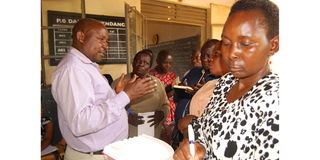Prime
Schools collaborate to attain quality education

Teachers of Kitante Primary School (R) interact with a teacher at Mbarara Municipal School in Mbarara City during a study tour last year. PHOTO | RAJAB MUKOMBOZI
What you need to know:
- School twinning is a programme that enables schools to collaborate, identifies opportunities for improvement by teachers, pupils and school management committees. This collaboration aims at improving performance.
Sustained good performance and quality holistic education is one of the challenges schools in the country are facing.
Coupled with competition, this has bred jealousy and selfishness which has kept some schools under lock and key to other schools but is this helping learners /schools? Key players in education now look at school twinning as one of the best practices to ensure quality and holistic education.
School twinning programme is where schools of different backgrounds share practices and resources. Though school twinning has been identified by players in education as one of the best practices of learning how quality performance can be attained and helping in solving some of schools organization challenges, it is often undermined or neglected.
Mr Simon Akandonda, a retired primary school teacher, notes that some schools which continue to perform poorly not because they do not have qualified teachers or poor facilities to enable them perform better, but because they have failed to be innovative. They do not come up with better approaches such as school twinning programme to improve their performance.
“As teachers we almost go to the same institutions, have similar qualifications, but you find your school has performed poorly for years but you cannot find reason for such. One of the reasons is that school managers have not been innovative; they keep on the same college script of many years ago. Apart from qualifications to achieve quality and transformative education you need to be innovative and come up with ideas to make you competitively better,” Mr Akandonda advises.
He adds that this is partly because some schools which used to perform well have seen their performance decline because they create unnecessary boundaries which prevent other schools from sharing knowledge.
The retired teacher adds that some people assume that education is about academic excellence alone yet they ought to master virtues such as behaviour and skills to raise a holistic child.
“School twinning programmes creates an environment for best practices not only in academics but other social transformative programmes for example skills and management practices,” adds Mr Akandonda.
Mr Andrew Bebuze, an inspector of schools in Mbarara District, notes it is high time schools discarded pride and selfishness, and collaborate if they are to succeed in offering quality-holistic education.
“Going for a school twinning programme does not mean it’s because you are performing poorly, education is not about academic excellence alone but how you bring out that pupil holistically. We have seen pupils who excel in academics but canonot make it in life. This can be because these students lacked other life skills to succeed, a gap that could have been overcome through programmes such as school twinning,” Mr Bebuze notes.
He adds that in the school twinning programme even school management committees can be involved to learn best practices such as managing human resource, bringing parents on board to support schools and learners.
Mr Bebuze emphasises that the bottom-line for school twinning is to identify opportunities for improvement by teachers, pupils and school management committees.
The deputy head teacher Mbarara Municipal Primary School Mr Asher Besigye, says they have been able to sustain excellent performance, and growth not because of only internal mechanisms in place, but also twinning.
“This tradition of twinning helps schools to share their weakness and strengths, you cannot lock your gates on other schools because you are a better performing school, because that is not sustainable. I advise schools at all levels to get out of their gates, pride and selfishness and collaborate if we are to offer quality education to a Ugandan pupil,” Mr Besigye says.
He identified some of the schools they work with in this programme as City Parents, Green Hill Academy, Mbarara Junior School, Bwanga Progressive in Rukungiri, and Ibanda Integrated School.
Mr Nathan Mugume, the head teacher Mbarara Junior School, says through the twinning programme they have been able to improve performance of some poorly performing rural schools.
“You do not do twinning with only better schools but even those you consider that are the worst performers, we have to stop being selfish if we are to uplift the education of a Ugandan child. We are proud that in our twinning programme we have been able to assist learners in rural schools to perform better,” says Mr Mugume before challenging administrators of especially poor performing schools to consider twinning as one of the best tools for success.




